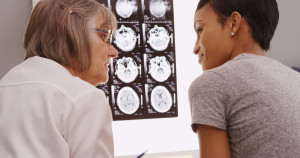 Strokes occur when the blood supply is temporarily blocked or cut off from the brain which causes damage to the oxygen-deprived brain cells. Strokes are serious and can lead to long-term brain injury, physical disability and even death. Stroke-induced brain injury is permanent cannot be reversed. Therefore, it is essential to recognize the signs quickly and seek treatment immediately if someone is having a stoke.
Strokes occur when the blood supply is temporarily blocked or cut off from the brain which causes damage to the oxygen-deprived brain cells. Strokes are serious and can lead to long-term brain injury, physical disability and even death. Stroke-induced brain injury is permanent cannot be reversed. Therefore, it is essential to recognize the signs quickly and seek treatment immediately if someone is having a stoke.
Each year more than 700,000 Americans suffer from a stroke. Of those 700,000, about two thirds or 460,000 survive and need rehabilitation. Depending on the type of disability, rehabilitation can help people to achieve the more independence and best quality of life possible after a stroke. There are five main types of disabilities that can be caused by stroke:
1. Motor control issues – This includes paralysis on either side of the body and issues with swallowing, posture, walking, balance and loss of continence (not always being able to hold in urine, especially while coughing, sneezing or lifting).
2. Unusual physical sensations – This includes feelings of pain, tingling, numbness or the inability to recognize touch, temperature or pain.
3. Speech and language difficulties – This includes speaking, writing and understanding language. At least one-fourth of stroke survivors suffer from language impairments.
4. Reasoning – This includes problems with planning, thinking, memory and judgement. Stroke survivors can have very short attention spans or short-term memory loss. Making plans, learning new things, and engaging in complex tasks can be very difficult, if not impossible.
5. Emotional Problems – This includes emotional distress such as sadness, grief, depression and anxiety.
The cerebral cortex in the brain has two main hemispheres. The right hemisphere controls emotions, cognition and spatial orientation while the left side controls language. Strokes can cause injuries to either side of the brain and which side is affected can determine what problems the survivor could be permanently faced with.
Changes after a stroke with a left-brain injury
• Paralysis – Left-brain injuries from stroke can often cause weakness or paralysis on the right side of the body.
• Behavioral Changes – Individuals who have suffered from a left-brain injury after a stroke will sometimes behave more cautiously or reserved compared to before the stroke.
• Aphasia – Difficulty speaking and understanding written and spoken language.
Changes after a stroke and a right-brain injury
• Paralysis – Right-brain injuries from stroke can often cause weakness or paralysis on the left side of the body.
• Decreased cognitive skills – A right-brain stroke survivor might suffer from shorter attention spans and short-term memory loss.
• Behavioral Changes – Individuals who have suffered from a right-brain injury after a stroke will sometimes behave more impulsively and have poor judgement compared to before the stroke.
• One-sided neglect – A common effect of stroke is a lack of awareness/neglect of one side of the body. Someone suffering from one-sided neglect will unconsciously neglect things that go on for that side the body. For example, they might bump into objects on that side or not eat food on half of their plate.
• Confused communication – Right-brain injury sufferers might find it difficult to understand and express both facial expressions and tone of voice while communicating.
• Dysarthria – Many right-brain injury sufferers have a difficult time pronouncing words properly due to dysarthria (weakness or the lack of muscle control on the left side of their mouth or face).
If you or a loved one has suffered or is at risk of stroke please contact the Houston stroke specialists at OakBend Medical Center. OakBend Medical Center has been designated as a Primary Stroke Center by the Texas Department of State Health Services. For more information or to schedule a tour please call them now at 281-341-3000.
Strokes and Brain Damage
OakBend Medical Center © 2024 All rights reserved
